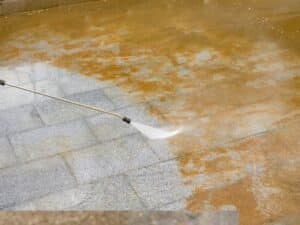Keeping your garage floor clean is more than just an aesthetic choice—it’s a practical necessity. Oil leaks, grime buildup, and dust accumulation all take a toll on your garage’s functionality and safety. That’s where the question of pressure washing garage floors comes into play. Is it a safe and effective method, or could it do more harm than good? Understanding the balance between power and precision is key. This article explores the risks, methods, and long-term benefits of pressure washing garage floors effectively.
What problems arise from not pressure washing garage floors?
Skipping regular pressure washing can create problems that aren’t just cosmetic. Over time, unclean garage floors become breeding grounds for damage and safety hazards.
- Stubborn stains build up: Grease, oil, and paint become harder to remove the longer they sit.
- Slippery surfaces increase risks: Accumulated grime can lead to slips and falls.
- Corrosive damage escalates: Chemicals and road salts left on concrete slowly erode its surface.
- Dust and allergens accumulate: Fine particles collect in the air, compromising indoor air quality.
In the long run, ignoring garage floor cleanliness doesn’t just lead to unsightly messes. It also accelerates wear and tear on the concrete, shortens the lifespan of the surface, and can turn into a breeding ground for bacteria and mold, making pressure washing a practical necessity rather than a luxury.
Why does pressure washing garage spaces require caution?
Pressure washers are powerful tools—handy but not without risk. If used carelessly, they can cause structural damage or personal injury.
- Too much pressure breaks concrete: Using the wrong setting can chip or crack your floor.
- Water seeps into gaps: Excess moisture may seep into walls and create mold or mildew.
- Unskilled handling risks injury: Spraying too close or at the wrong angle can cause rebound spray or cuts.
- Delicate areas get damaged: Garage doors, trim, or electrical outlets may suffer if not protected.
Even experienced users must remain vigilant. A misstep with a high-pressure washer can result in damage that costs more than the entire cleaning job. Paying attention to equipment specs, surface conditions, and environmental risks ensures you don’t accidentally turn cleaning into a costly repair job.

Can neglecting garage cleaning lead to long-term damage?
Yes—garage floors aren’t indestructible. When grime, chemicals, and debris accumulate, their effects become more than skin-deep.
- Weakened surface strength: Long-term neglect leads to pitting, cracking, and disintegration.
- Increased pest attraction: Rodents and insects are drawn to food residues or hidden messes.
- Higher repair costs: Damage left unchecked may require resurfacing or even slab replacement.
- Reduced property value: A dirty, damaged garage floor can turn buyers off in a flash.
Over time, the neglected buildup of contaminants like battery acid or de-icing salts leads to deep internal damage. These agents can break down the binding agents in concrete, leaving it brittle and weak. This silent destruction often goes unnoticed until repair is unavoidable.
What is the best method for pressure washing garage surfaces?
To safely pressure wash garage floors, you need a blend of the right equipment, settings, and techniques. Using reliable solutions for pressure washing garage surfaces helps prevent common pitfalls.
- Choose the correct PSI: Stick to 2,000–3,000 PSI for concrete; anything higher can cause harm.
- Use a surface cleaner attachment: This keeps pressure even and avoids streaks or gouges.
- Apply degreaser first: Loosens tough stains and boosts overall cleaning effectiveness.
- Allow surfaces to dry properly: Avoid closing the space up before the floor is fully dry.
Pressure Washing PSI Levels for Garage Floors
| Surface Type | Recommended PSI | Cleaning Tool | Pre-treatment Needed? |
| Concrete floors | 2,500 PSI | Surface cleaner | Degreaser |
| Epoxy coated floors | 1,200 PSI | Fan tip nozzle | Mild detergent |
| Tiled surfaces | 800 PSI | Gentle brush + rinse | None |
| Painted garage floor | 1,000 PSI | Surface cleaner (low) | Specialized cleaner |
For best results, schedule pressure washing during warmer, drier weather. This prevents lingering moisture and helps detect areas that might need resealing. Always finish with a moisture-resistant sealer to extend the life of the surface and reduce grime build-up between cleans.
How can pressure washing garage areas remove stubborn grime?
Grime might cling on like a bad smell, but high-pressure water has a way of shifting the most stubborn of messes. That said, not all grime is created equal.
- Oils and chemicals lift with heat: Hot water pressure washers break down engine grease faster.
- Stains need pre-treatment: A bit of elbow grease with degreaser works wonders before spraying.
- Algae and mold dissolve under pressure: Surface layers and spores are removed with precision.
- Fine dust clears from corners: High pressure flushes debris from tight spots and joints.
One underestimated step is letting the cleaning solution sit before blasting it off. Dwell time allows surfactants to penetrate deep into porous concrete, lifting grime for a much more effective clean. Pairing this with effective methods for removing oil stains from driveways ensures the results hold up longer.
What are the dangers of DIY pressure washing your garage?
Taking the DIY route may seem straightforward, but pressure washers can be deceptively tricky to manage. Doing it wrong can leave you with more than just wet shoes.
- Lack of experience causes mishaps: From uneven cleaning to damaged seals, poor technique creates extra work.
- Electrical hazards lurk nearby: Outlets and exposed wiring near water spell disaster.
- Improper cleaners degrade surfaces: The wrong detergent can stain or discolor your concrete.
- Injury risks are real: Many don’t realise how to avoid injuries when handling pressure washers until it’s too late.
The tools available at local hardware stores aren’t always up to scratch either. Most consumer-grade washers lack the pressure and flow rate for large garage jobs, making the work slow and inconsistent. Safety concerns aside, a pro can do it faster, safer, and with better results.

How does maintaining a clean garage benefit you in the long run?
A clean garage is more than a tidy space—it’s a functional, safer, and more appealing part of your home.
- Improved air quality: Dust and allergens stay under control with regular cleaning.
- Better organization: Clean floors make storage and movement easier.
- Stronger long-term structure: Prevents moisture damage and surface erosion.
- Increased safety: Reduces slips, trips, and other preventable accidents.
Regular pressure washing also reduces hazards that extend beyond the garage. It helps limit the transfer of grime and dirt into your home and keeps driveways and entryways safer, reinforcing the link between garage hygiene and how dirt on pathways impacts safety.
Final thoughts
When done correctly, pressure washing your garage floors offers long-term protection, improved safety, and a cleaner, more functional space. It’s not just about appearances—it’s about preserving your home’s value and avoiding costly repairs down the line. For guidance on what a professional clean can achieve, see how JBM Janitorial can transform your surfaces with power washing and approach your next cleaning project with confidence.

